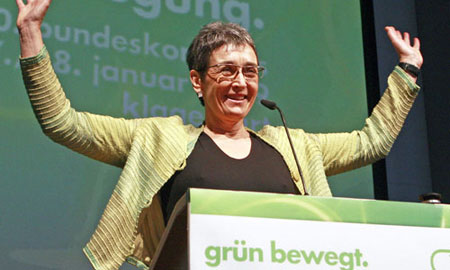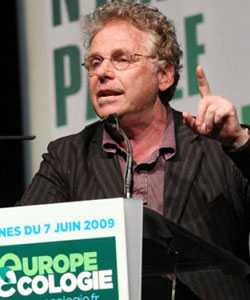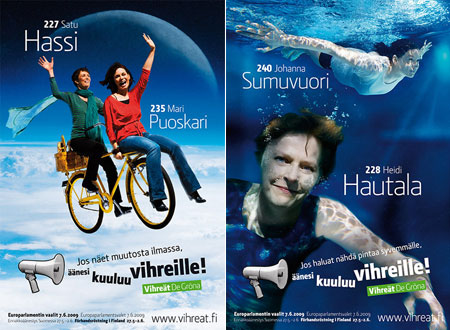“Think Big, Vote Green”
Share
Greens Elected in Record Numbers to European Parliament
by Mike Feinstein, member International Committee of the Green Party of the United States
Since 1979, Greens in Europe have won seats in national parliaments with growing frequency starting with Switzer≠land (1979), Belgium (1981) and West Germany (1983). Today there are over 250 European Greens holding seats in 17 national parliaments. What has marked almost all of their elections over the last 30 years is that Greens are trusted on issues of the environment and also on peace and social justice; but not the economy. In this yearís European elections however, against the backdrop of the worldís worst global economic crisis since the 1930s, this has be≠gun to change and Greens are being seen by more voters as having a credible economic approach.
On June 4th-7th, elections to the 736-seat European Parliament (EP) were held in 27 countries. Greens received more than 10 percent in seven of them, up from four in the last EP elections in 2004, and won 46 seats overall, up from 35 in 2004 (when the EP had 785 seats). While the 2009 Euro≠pean elections saw the rise of some fringe right wing, xenophobic parties and anti-EU parties, among the existing EP parliamentary blocs, the Greens were the only one whose proportion of seats increased, from 5.5 percent to 7.1 percent.
The most Green seats were won in Ger≠many (14) and France (13), while the highest percentage of the vote came in Wallonia, the French-speaking part of Belgium, with 23.3 percent. Perhaps the greatest breakthrough came in Greece, as Green Oikologoi-Prasinoi celebrated the election of its first member of EP (MEP) Michalis Tremopoulos.
A Green New Deal
The campaign centered around a common platform for Green Parties across Eur≠ope, based upon the theme of A Green New Deal for Europe, which was adopted at the European Green Party Congress, March 27th-29th, held at the European Parliament in Brussels and attended by more than 1,200 people from across Europe and around the world.
Through a combination of private and public investment in environmental initiatives amounting to 500 billion Euro over five years (0.75 percent of the EUís GDP), the Green New Deal would create five million “green-collar” jobs in renewable energy, social care, sustainable housing and public transportation, according European Green Party (EGP) co-spokesperson Philippe Lamberts, who was elected on the Ecolo (Wallonia, Belgium) list. “Voting Green means voting to put Europe at the forefront of a global economic revolution.”

Ulrike Lunachek, Austrian MEP
Added EGP co-spokesperson Ulrike Lunacek, who was elected the Die Gr¸nen list (Austria), “A truly prosperous and sustainable economy requires more social justice in Europe and abroad. The Green New Deal advocates equal opportunities, fair working conditions, anti-discrimination and a decent standard of living for all. We will continue to fight hard for the strict application of the Charter of Fundamen≠tal Rights and for a EU that reinforces social and labour rights, guarantees equal pay for equal work for men and women alike, as well as for posted, immigrant or temporary workers. Ö Our manifesto also includes specific proposals to make the EU a truly participatory democracy, including giving the European Parliament the right to initiate legislation. Prioritizing Fair Trade and increasing the budget for overseas development are also vital components of the Green New Deal.”
The Green New Deal drew support from some well-known circles. Vaclav Havel, the Czech playwright, nonviolent revolutionary, and former president of “Velvet Revolution” fame endorsed the Czech Green Party Strana Zelenych and criticized the Czech Republicís two largest parties for focusing on economic growth with no regard to anything else. Added noted British climate change author George Monbiot, “If you vote Green, you tell the political class exactly what you want.”
A European Message, A European Campaign
Although the EP is a European-level legislative body, its elections are held separately in each of the 27 member states and have generally reflected national party campaigns conducted wholly within that nationís borders. In 2004, the European Greens were the first to campaign Euro≠pean wide, including a common platform and graphics, as well as candidates appearing outside of their own countries in which they were running. This continued to an even stronger degree in 2009 and apparently voters responded well to this approach, especially in a time of an economic crisis that transcended national borders.
According to Thomas Klau of the Cen≠ter for European Reform, the most striking feature of the election results “is the fact that the center-left parties across Europe, the Social Democrats and Socialists have not been able to give a plausible answer, political answer, to the economic crisis. We havenít seen … a far-right wave washing across the European continent. That has not happened. The rise of the Green Party has been striking. The Green Party is the one political force in the EU that has (been) closest to creating a true Euro≠pean political party, a true European political movement … with a political message that is strong and plausible, pro-Euro≠pean, that looks for European answers to the big problems the world and Euro≠pean society are facing, starting with climate change, of course. The success of the Greens Ö is a clear indication there is a substantial part of the electorate that responds positively to European parties that give a Eur≠o≠pean answer to the big problems of the day.”
 Perhaps the greatest example of the Greens international approach was the campaign of Dany Cohn-Bendit, the famous ëDanny the Redí from the 1968 student riots in Paris and current co-president of the Green Group in the European Parliament. A German MEP from 2004-2009, Cohn-Bendit ran and was elected as a French candidate this June. He said “I am a European MEP. I am trying to find a Eur≠opean common interest. I am not defending a national position. It is the same messageóthe Green messageówhether I am standing in Germany or France.”
Perhaps the greatest example of the Greens international approach was the campaign of Dany Cohn-Bendit, the famous ëDanny the Redí from the 1968 student riots in Paris and current co-president of the Green Group in the European Parliament. A German MEP from 2004-2009, Cohn-Bendit ran and was elected as a French candidate this June. He said “I am a European MEP. I am trying to find a Eur≠opean common interest. I am not defending a national position. It is the same messageóthe Green messageówhether I am standing in Germany or France.”
The European Green Congress also nominated a team of ëGreen Ambassa≠dorsí to travel and participate in the debates all over Europe in the members states, made up mostly of experienced and well-respected Green politicians and former MP and/or MEPs.
Since the Greens first won seats to the EP in 1984, they have joined with kindred MEPs from small regional and/or democratic nationalist parties in forming their official parliamentary group. This is important because within the EP, the size of a parliamentary group determines how much time it gets proportionally within parliamentary debates, as well as the amount of financial resources it is accorded.
Since 1999 the Greens have participated together with the European Free Alli≠ance to form the Greens-EFA group, which in the last EP had 35 Greens and 8 EFA MEPS. The new group will have 46 Greens and 7 MEPS. This maintains the Greens-EFA as the fourth largest parliamentary group.
ìVoting Green means voting to put Europe at the forefront of a global economic revolution.î
For more information: www.europeangreen.eu and www.greens-efa.org

Campaign posters for successful Finnish Greens, Satu Hassi and Heidi Hautala




